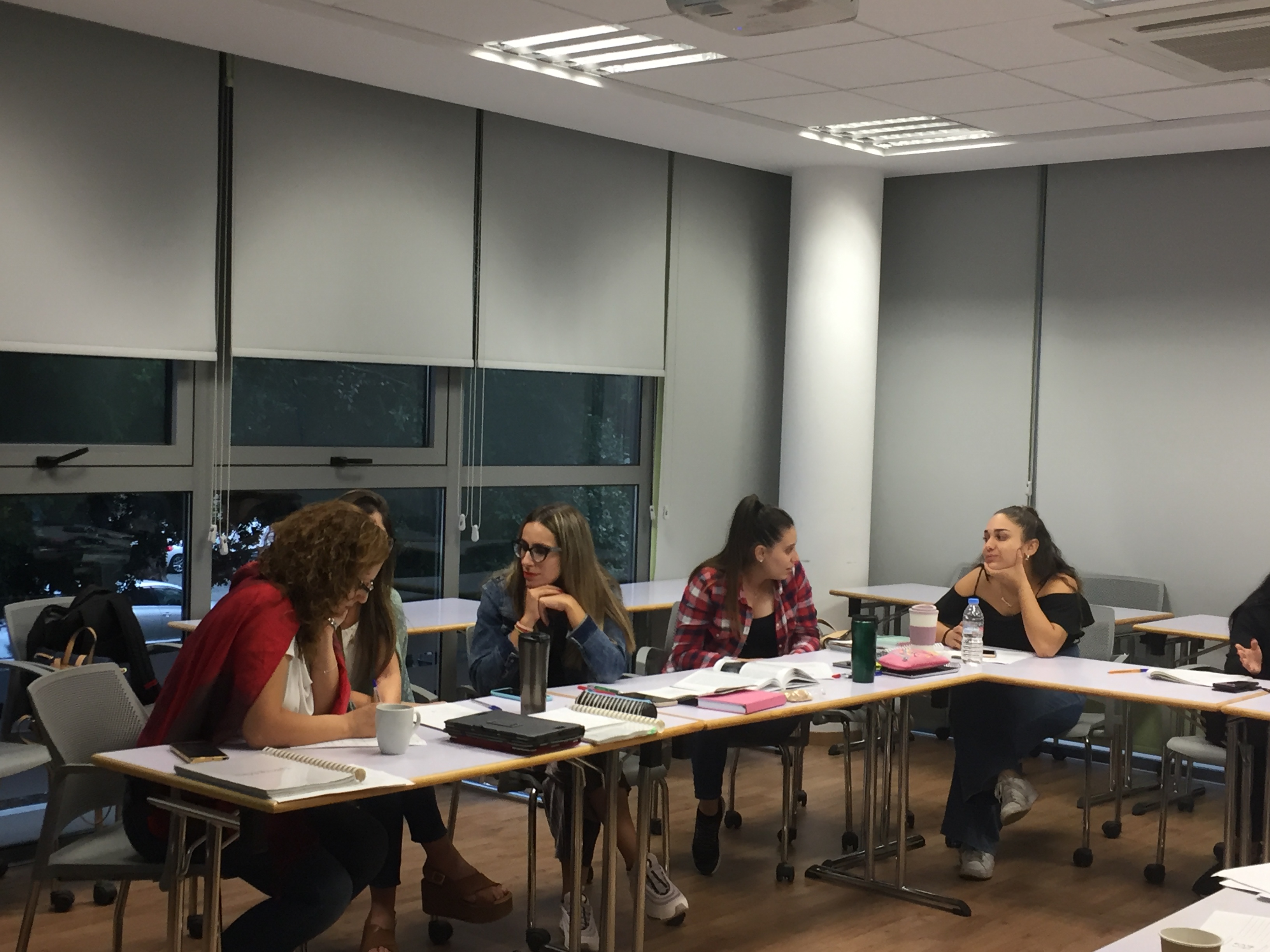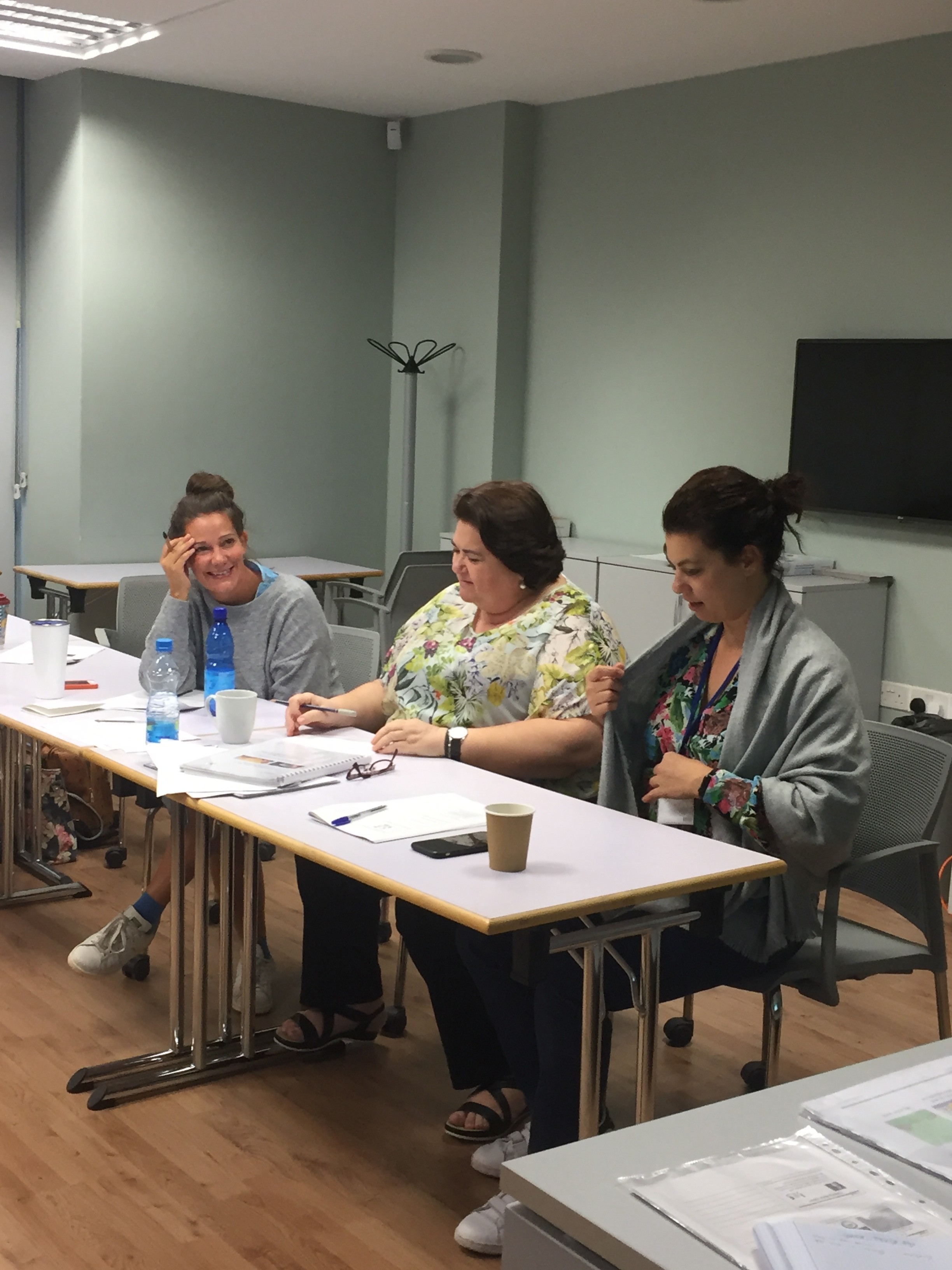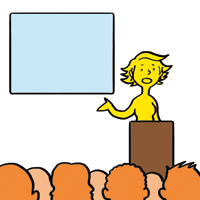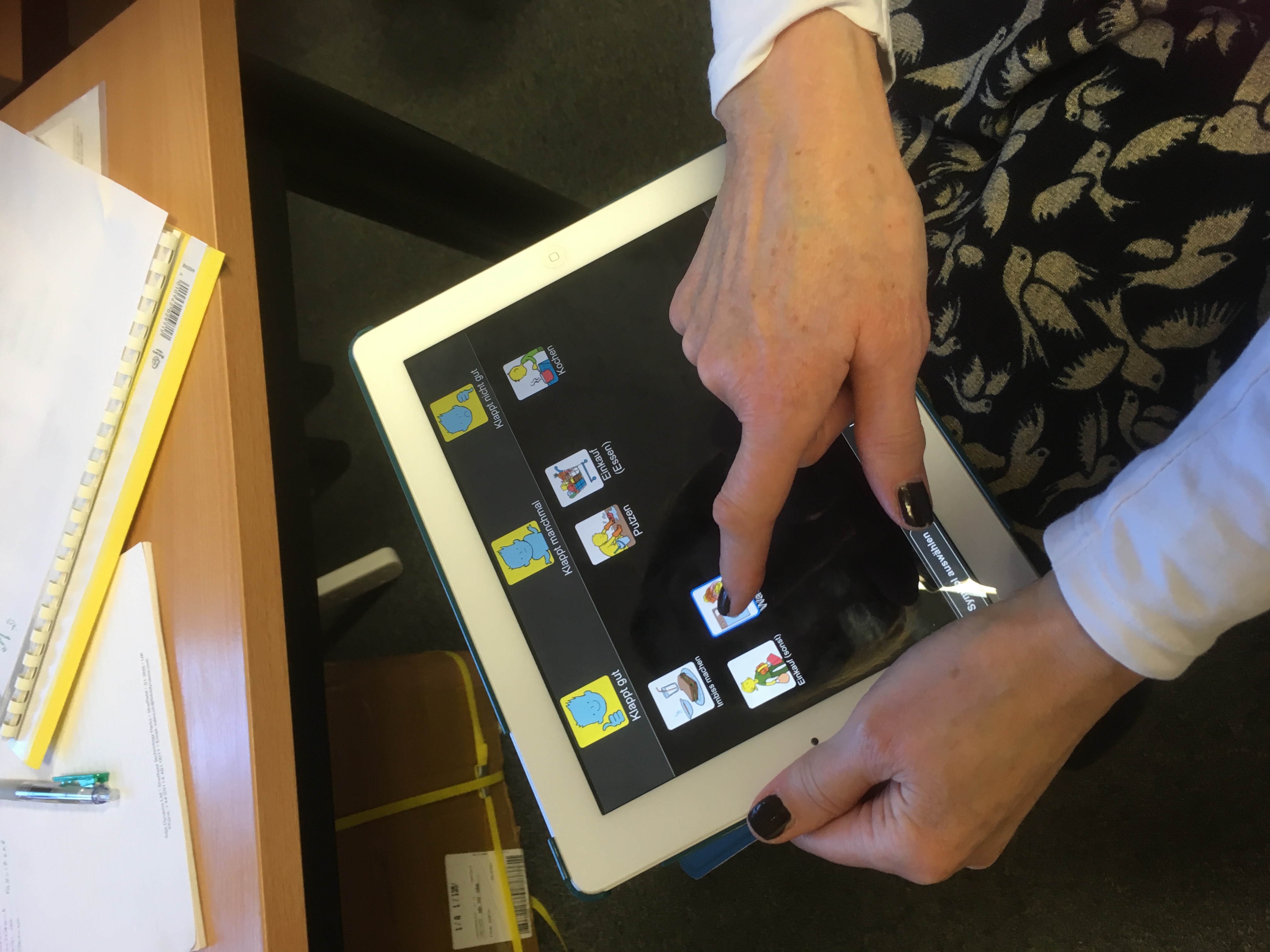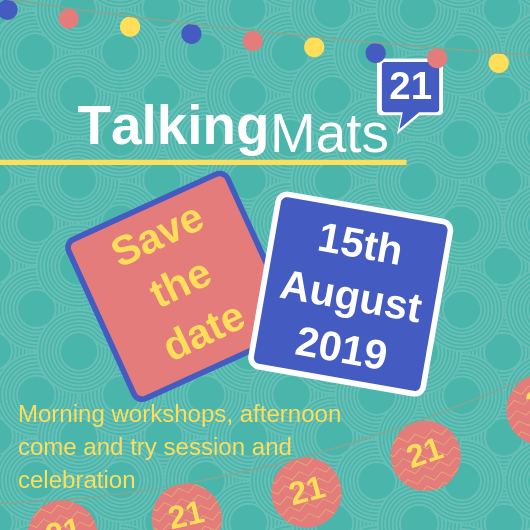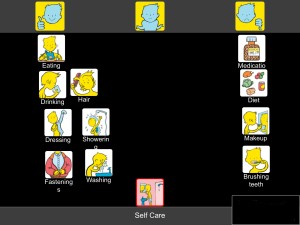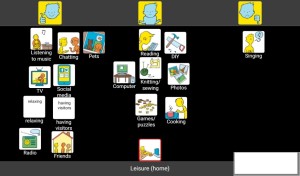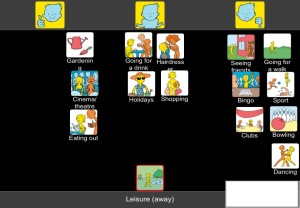Many thanks to our Talking Mats Founder, Dr Joan Murphy, for this latest blog talking about the training course she recently delivered at the Cyprus University of Technology.
Cyprus is a beautiful Mediterranean island with a population of approximately 1 million.
I was invited by Dr Eliada Pampoulou to run a 2-day course on Talking Mats for 12 Speech and Language Therapists, some of whom are masters students and some, lecturing staff at the Cyprus University of Technology. The Cyprus University of Technology founded the first Department of Rehabilitation Sciences in Cyprus and the Department offers the first public recognised university bachelor degree in Speech Language Therapy / Speech Language Pathology in the Greek language (https://www.cut.ac.cy/faculties/hsc/reh/).
Day 1 was a Talking Mats foundation training course and Day 2 focused on discussion around capacity, research and clinical applications. This model worked very well as the participants were able to think about and discuss how to apply the training immediately.
Some of the immediate plans of the participants were both clinical and research oriented and are outlined below:
- To administer the Greek Stroke and Aphasia Quality of Life Scale (SAQOL-39) with healthy people over 50 both with the text version and an adapted Talking Mats version quality and to examine which they prefer.
- To use Talking Mats both with people with people with aphasia and their carers in order to share their understanding about the communication skills and needs of people with aphasia.
- To use Talking Mats as a tool to identify the factors that are related to AAC system acceptance or abandonment by focusing directly to the views of people with complex communication needs
- To use Talking Mats as a goal setting tool for both paediatric and adult population
- To use Talking Mats to gets clients feedback about therapy services
- To use Talking Mats for student appraisals regarding their clinical training
Dr Eliada Pampoulou has created the first Talking Mats centre in Cyprus which aims to gather all people who received training every few months to share their experiences and support each other to embed Talking Mats in practice and research.
We hope that Eliada will come to Stirling next year to gain her Talking Mats licence to enable her to train others and extend the reach of Talking Mats even further.
We regularly run our Licensed Trainer 2-day courses at our base in Stirling – if you have attended Talking Mats Foundation Training and would like to train other people find out more here:
https://www.talkingmats.com/training/train-the-trainers-accredited-training/
Talking Mats is now used in many countries all over the world. As part of our #TMis21 blog series, we wanted to share this great example of Talking Mats being used in Germany.
In March 2019 Prof. Dr. Norina Lauer (OTH Regensburg) and Elena Maxheimer held a lecture and a workshop about Talking Mats at the “aphasia days” in Wuerzburg, Germany. Many thanks to Norina and Elena for sharing information about the “aphasia days” for this blog post.
The “aphasia days” are a large congress – unique in Europe – for people with aphasia, family members and speech and language therapists (SLT). Every year around 600 people from Germany, Austria, Switzerland and Hungary are coming to this event. There are talks, workshops and podium discussions held by participants with aphasia, family members or SLTs. In front of approx. 150 listeners Norina and Elena gave a lecture about Talking Mats and the results of Elena’s bachelor thesis, in which she worked with people with aphasia, who learned to use Talking Mats.
In a three-hour workshop at the “aphasia-days” Norina and Elena taught nine people with moderate to severe aphasia how to use Talking Mats. All persons brought their own tablets and logged into their own account. They where shown how to choose a topic and a top scale and practiced in teams of two. All of them conducted several sessions with different topics and switched partners a couple of times. They had a lot of fun talking about things that matter to them and learn more about their peers. At the end of the workshop they were able to use Talking Mats themselves and are going to use it with their relatives and friends at home. As the workshop was very well received by the participants, it is likely to be repeated at the next “aphasia days” 2020.
If you would like to find out more information about Talking Mats in Germany, and the Digital Talking Mats app which is now available in German, check out https://www.talkingmats.com/talking-mats-in-germany/ and https://www.talkingmats.com/german-digital-talking-mats-with-people-with-aphasia/
Our Talking Mats is 21 Event is in Stirling on Thursday 15th August 2019. Thanks to funding from NHS Forth Valley endowment committee the event is free but you do need to book your space https://www.eventbrite.co.uk/e/talking-mats-is-21-tickets-62362171935
You can come to the morning only, afternoon only or come for the whole day.
If you can’t come to our event watch out for out blogs and social media celebrating the reach of Talking Mats for 21 days before the 15th of August. Please join in with your contributions using the hashtag #TMis21. For 21 days after our event we will be having a special Birthday offer! Watch this space, more to follow …….
In this latest blog, our Talking Mats OT Associate, Rachel Woolcomb tells us how Talking Mats can support delivery of Personalised Care:
“Person centred practice”, and “partnership approach” are common phrases heard in health and social care settings but what does this really mean in practice?
How good are we at ensuring our service users are truly heard, and given opportunities to talk about what is important to them?
Recently NHS England set out their ambitions for the delivery of personalised care. This is a commitment to enabling people to have the same choice and control over their mental and physical health that they have come to expect in every other part of their life.
This however requires a shift in culture.
One of the cornerstones of personalised care is shared decision making. This is a collaborative process in which people are supported to understand the options available to them including the various risks, benefits and consequences. A shared decision will have acknowledged personal preferences, circumstances, values and beliefs. This ensures that when a choice is made it is fully informed.
There is substantial literature which demonstrates the usefulness of goal setting as part of the communication and decision making process.
A well written person-centred goal will describe the anticipated achievement of a specific activity. It will be meaningful and help create a common vision within the rehabilitation process.
Talking Mats is an ideal tool to help facilitate these processes. They enable better conversations and provide an interactive thinking space. They have also been demonstrated to be a useful tool in enabling people to think about their rehabilitation goals.
Read more about this in the TMOT Resource 2: How Talking Mats can help facilitate shared decision making and goal setting: Goal setting TMOT 2
If you would like to find out more about the different Talking Mats training options we offer, take a look here: https://www.talkingmats.com/training/
We are delighted to introduce Rachel Woolcomb our first Talking Mats OT Associate. She is joining the Talking Mats Team and will be working to develop awareness and use of Talking Mats by Occupational Therapists. I will let Rachel introduce herself:
I am delighted that Talking Mats have asked me to join their team for one day a week. I am passionate about occupational therapy and about Talking Mats and to have the opportunity to bring these two loves together and seeing what develops is very exciting.
I live in South Gloucestershire and have had a varied career since I qualified as an Occupational Therapist in 1992. I was introduced to Talking Mats in 2008 and have never looked back, using them with my clients ever since.
In 2017, having spent over 25 years working in the NHS, I made the decision to move into independent practice. I work predominately with teenagers and adults who live with long term neurological conditions or who have experienced catastrophic injuries following trauma. I am very aware of the psychological impact of sudden disability and the need for people to be able to express who they are and what is important to them, even in difficult circumstances.
I now use Talking Mats with most of my clients. It doesn’t matter if they are old or young, can speak or have communication needs, they all benefit from the opportunity to stop and think and have someone really listen to them.
In the last few weeks a man who has had a stroke and has limited expressive speech has used a Talking Mat to talk about what leisure activities he used to enjoy. He then used a second mat to explain what he can and cannot achieve now. This helped us together, set goals for occupational therapy. I am also working with a teenager who has had a traumatic brain injury and now struggles with her education. She uses Talking Mats with me regularly, to think about her coping skills at school. Looking back at her previous mats is helping her to recognise progress. I have so many more examples and will be sharing them with you soon!
I really want to inspire OT’s, helping them to consider how they enable their clients to think, communicate their choices and make decisions. A Talking Mat is a great for this. It is also creative and interactive something that in my experience OT’s like! I will also be looking at important issues within the field of occupational therapy that are currently driving practice, such as personalised care, goal setting and shared decision making. I believe it is vitally important that we collaborate with our clients as together we can achieve so much more. Talking Mats is an effective tool in enabling this, so watch this space, and please do get in touch if you want to know more or have stories to share.
It is great to have Rachel working with us to build on some of the excellent work being done already in the Occupational Therapy Sector. Our Director, Lois Cameron shares why we are so excited to welcome Rachel to our Team:
‘I am really pleased that Rachel is joining us . I think the Talking Mats approach sits well with the values and approach of Occupational therapy, In my experience OTs are naturally holistic in their approach. I remember at a training course in London an OT said for her Talking Mats was the missing link in her toolkit. The training and experience of OTs allow them to see things through a different lens and that will be really helpful to us’
For more information about how OT and Talking Mats are a winning combination, take a look at Rachel’s recent blog – https://www.talkingmats.com/talking-mats-and-ot-a-winning-combination/
Feeling inspired and want to know more about the training courses we offer? See www.talkingmats.com/training/ for details.
Grateful thanks to Prof. Dr. Norina Lauer, OTH Regensburg – University of Applied Sciences, Germany for this blog.
At the conference of the German Society for Aphasia Research and Treatment (GAB) from the 1st to the 3rd of November Franziska Rau presented a poster – Let pictures talk – about her bachelor thesis on Talking Mats.
Speech and language therapists from German-speaking countries meet at this conference to present their latest research findings. This year’s theme was ” Aphasia Therapy Digital”.
The presented bachelor thesis about Talking Mats was performed at the HAN University of Applied Sciences, Netherlands, and was written by Franziska Rau together with Karoline Bitter and Lara Stobrawe. The students asked 29 people with aphasia and 63 people without aphasia for how representative they rated the images and terms used in the Communication section of the Digital Talking Mats Health & Well-being resource. While the healthy persons judged many items as not clear enough, the people with aphasia estimated significantly more pictures and names as appropriate. For this purpose, various reasons have been discussed, such as the possibility that the persons with aphasia directly perceived the pictures and terms as aids, while healthy persons judged more critically on the basis of the task. But also problems of concentration or comprehension in people with aphasia would be causally conceivable. This should be examined in further studies.
The poster was presented as part of a poster session and was well received by the audience. Thanks to Franziska, Karoline and Lara for their great study and to Holger Grötzbach, Janine Coopmans and Xaver Koch who supported the students.
We are always happy to receive projects and posters from anyone studying how Talking Mats can be used
Talking Mats in Germany is being extended by one of our trainers Professor Norina Lauer. Here she describes two of her current interesting projects and we look forward to reading her findings.
The German version of the Talking Mats app will now be tested in two more projects in the west of Germany. As the communication symbols were developed for English-speaking clients six German SLT students of the Hogeschool van Arnhem en Nijmegen (han) in the Netherlands want to find out if the words and symbols fit to German clients and their cultural background. Because of cultural differences between Scotland and Germany it is necessary not only to adapt the language but also check the icons.
One of the projects will be conducted with children between the ages of 8 and 10 years. The children will be asked to classify the symbols from their age-group. The question will be whether the symbols and words are relevant for the situation of German children. If not, they will be asked for possible alternatives.
The other project focuses on adults. One group of people with aphasia and one group of healthy persons will be tested. Every tested person scores the 57 icons concerning their correspondence with the words written down below by using a scale from 0 to 3. In addition, possible graphic alternatives will be enquired and collected. The two groups of adults will be used to determine if there is a significant difference between the obtained results from each group.
We are now half way through our project, funded by The Health and Social Care ALLIANCE Scotland, whose overall aim is to empower people with a range of long term conditions, with and without additional communication difficulties, to self-manage their own health and well-being by using Digital Talking Mats.
Participants
We have carried out all the initial visits and 16 follow-up visits and participants are sending in their completed mats, choosing whichever topics they want from the digital Health and Well-being resource. At the time of writing this blog we have received 137 completed mats.
We have received very positive feedback with many examples of how people are using the Digital Talking Mats to self-manage.
Here are 3 examples:
One participant with learning disability has diabetes. Through using the Digital Talking Mats she has stopped buying takeaways every night and is now buying M&S ‘Balanced for You’ meals. This is a huge step forward for her as she refused to discuss healthier eating before.
A man with early onset dementia has identified that he used to enjoy singing and has decided for the first time in his life to join a choir. This is not something that had come up in conversation before. Despite the diagnosis of dementia he has realised that he is still keen to try new things.
The wife of a man with severe aphasia said ‘This (Leisure away) has highlighted how few things he can do away from home. We discussed this but can’t see how we can change the situation.’ However at the second visit he used the same mat and indicated that he had been thinking about his mobility and was about to start swimming and a fitness class.
We already have an increased awareness of the meaning of self-management as we observe how participants are using the Digital Talking Mats to think about their situation, state their own views and share them with carers/support workers. We are also noticing that there is a shift in some relationships as the carers/support workers realise that the person with the long term conditions can make decisions and express their own views rather than having decisions made for them.
Thanks to Gill Pearl for sending us this information about an international conference for people with aphasia.
Where: Warwick Conference Centre, Coventry, England
When: Sunday 5 and Monday 6 March, 2017
Families, friends, aphasia and stroke organisations, and health professionals are also invited. People with aphasia have planned the conference and will chair the sessions.
The information will be presented in a way that is easier for people with aphasia. There will be support from therapists and students to help people to join in.
The following themes will be discussed
- technology and aphasia, learn and have a go
- increasing awareness of aphasia, and using social media
- sharing what’s happening about aphasia around the world
- research
- support for carers of people with aphasia
- aphasia and the arts.
There will be an exhibition of products relevant for people living with aphasia
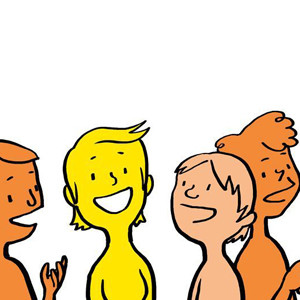
- Do something new, develop confidence, be inspired
- Learn from each other and share ideas
- Find out about new services and ways to help
- Meet people with aphasia from around the world!
If you want to find out more, contact Gill or Denise at
- info@buryspeakeasy.org.uk
- gill@buryspeakeasy.org.uk
- 01706 825802 (part time office)
 Online training login
Online training login 

